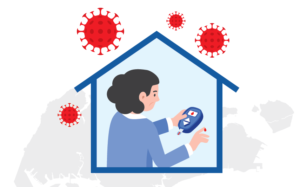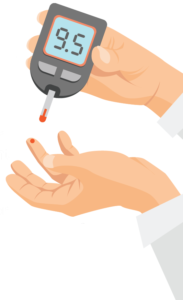The Singapore multi-ministry Task Force for the COVID-19 pandemic implemented the Circuit Breaker (CB) in Singapore with effect from 7th April 20201. Only essential services were allowed to continue operating, including health services1. Individuals aged 50 years and above and those with other chronic illnesses had poorer outcome when they contracted COVID-19 infections2.

Practical Tips for Diabetic Patients During the COVID-19 Pandemic
Dr Tan Chee Eng
Consultant Endocrinologist
MBBS, MMed (Int Med), FAMS, PhD
Gleneagles Medical Centre

Individuals with diabetes mellitus (DM) fall under the high-risk group and many also suffer from high blood pressure, high cholesterol, and heart disease2.


Should I postpone my regular follow up with my doctor?
DM is a chronic illness requiring regular follow up, especially if the glucose control has not been good (HbA1c >7%, which indicates glucose control in the past 3 months). For those whose DM is well controlled i.e. HbA1c less than 7%, postponing regular follow up for 2 to 3 months is safe but not any longer. However, it is important to maintain a healthy diet and lifestyle and be compliant with your medications even if you have postponed your appointment with your doctors.


Those whose DM was not well controlled prior to the CB or have not consulted your doctors for more than 6 months, it is inadvisable to postpone your medical review. Data from Singapore’s COVID-19 patients revealed that DM patients with HbA1c>7.2% may be at greater risk than someone with good control3. Patients not on regular review by doctors may be tempted to be careless with food intake and non-compliant with medications, leading to deterioration in blood sugar.
Changes in food intake
Most have been working from home since the CB was implemented and this has affected food intake and physical activities. Some of my patients showed significant improvement in blood sugar because most meals are home cooked, business lunches and eating out have been suspended. Meal times are more regular and compliance with medications have improved. Some even had significant weight loss because of better diet.
Another group of patients experienced worsening of blood sugar because they were raiding the kitchen larder for snacks whilst working from home. Others have increased their intake of carbohydrates (rice, noodles, bread, pastas) because they were bored with the monotony at home and carbohydrates are comfort food. Weight gain and worsening of blood sugar is to be expected when dietary control is neglected. Deterioration in blood sugar may not be accompanied by any symptoms and therefore, it is important to monitor blood sugar periodically, especially if there are changes in daily activities and eating patterns.
It is important to have a glucose meter readily available to monitor your blood sugar during the CB, especially if you have postponed your appointment with your doctors. Any significant changes in the blood sugar can then be reported to your doctor via remote, phone or email consult.

Changes in physical activity
Working from home has translated into time saving for some patients, which could be invested in exercise. The ability to participate more regularly in exercises such as walking, jogging or other home-based exercise routine translates into improved blood sugar. Keeping fit during the CB period helps DM patients cope with stresses of working from home and also promotes mental well-being.


Sadly, some patients have significantly reduced their physical activity because there is no need to commute to the workplace. Others are fearful of engaging in outdoor exercises but there are plenty of indoor exercise routine freely available on the internet. Some DM patients are spending more time on their computer because of work or watching too much Netflix. Such sedentary lifestyle is unhealthy and making time for regular physical exercise is vital.
What should I do if there are changes in my blood sugar?
We are all creatures of habit and many patients time their medications with certain routines in their work life. Perhaps medications are taken when they have breakfast at the office or lunch with colleagues but that routine has been disrupted and they forget to take their medications. Non-compliance with the prescribed medications will definitely affect the blood sugar. Changes in meal patterns, snacking between meals or forgetting to take meals because one is too busy with work, will all impact the blood sugar. Symptoms of low blood sugar (cold sweats, hunger pangs, light-headedness, loss of concentration) should preferably be confirmed by a glucose test at home before taking corrective measures. Others may reduce the dosages of medications on their own because they assume their blood sugar is better because they are eating at home without first checking their blood sugar. Patients should consult with their doctors (remote, phone or email consult) if they are experiencing frequent episodes of high or low blood sugar rather than adjust medications on their own. The medications may need to be adjusted if indicated because of the changes in lifestyle but only in consultation with their doctors.
Good sugar control will mitigate against the risk faced by DM patients during the Covid-19 pandemic. It is important to monitor your blood sugar, watch your diet, engage in some physical exercise and be compliant with all your medications, including those that control blood pressure and high cholesterol.
Stay safe and healthy.
References: [1] Ministry of Health Singapore. CIRCUIT BREAKER TO MINIMISE FURTHER SPREAD OF COVID-19 [Internet]. 2020 [cited May 8 2020]. Available from: https://www.moh.gov.sg/news-highlights/details/circuit-breaker-to-minimise-furtherspread-of-covid-19. [2] Centers for Disease Control and Prevention. Information for Healthcare Professionals: COVID-19 and Underlying Conditions. Accessed May 15, 2020. Available from: from https://www.cdc.gov/coronavirus/2019-ncov/hcp/underlying-conditions.html [3] Leo YS. Clinical and Diagnostic Updates – COVID-19: The Singapore Experience (Part II). [Webinar]. 1 May 2020 [cited May 8 2020].
PC-SG-100539 May 2020